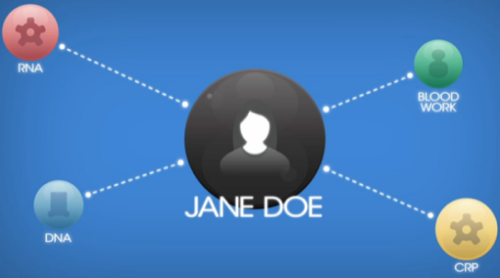
One of the top four trends identified in Rock Health’s report on digital health was data / analytics. Arguably, big data is the most important factor in transforming the healthcare system – given the vast amount of genetic and other medical data available today, combined with the increasing prevalence of mobile health apps and EMRs (Electronic Medical Records). One company thinking big about big data in healthcare is GNS Healthcare. The Cambridge, MA. firm has developed a large-scale technology platform that crunches huge data sets and delivers personalized medical recommendations.
Big Data has been a trend in Internet technology in many markets, such as social networking, e-commerce and enterprise. But as GNS explains on its website, big data is particularly relevant in healthcare:
“The healthcare industry is now awash in data: from biological data such as gene expression, SNPs, proteomics, metabolomics to, more recently, next-generation gene sequence data. This exponential growth in data is further fueled by the digitization of patient-level data: stored in Electronic Health Records (EHRs) and Health Information Exchanges (HIEs), enhanced with data from imaging and test results, medical and prescription claims, and personal health devices.”
Delivering Personalized Healthcare
GNS uses machine learning, run on “massively parallel cloud-based supercomputers,” to analyze all of this data and make use of it. Its core technology is called REFS (Reverse Engineering and Forward Simulation), which is explained in this video:
The overall goal of REFS is to help healthcare providers deliver “personalized medicine” to their patients. REFS uses a patient’s DNA, molecular and clinical data to try and ascertain what the best medicine is for that person.
Real World Data
Colin Hill, the CEO and Chairman of GNS Healthcare’s parent company Via Science, recently wrote that the key to GNS’s approach is “real world data.” He defined that as “any data not generated from a randomized clinical trial (RCT).” Whereas RCT data comes from a controlled experiment, real world data is not controlled – but simply observed. It’s “everything from insurance claims and lab tests to patient registries and health IT systems.”
Last August Hill told Metro Business Media his overall vision for personalized healthcare:
“[My] vision is where data is collected and ultimately put into a centralized repository in the cloud where technology like ours will be mining the data continuously to determine what’s working and what’s not working for whom.”
If you’re looking for the future of the Internet, it isn’t the next hot social video app. It’s software that aims to change people’s lives – perhaps even save lives. We’ll continue to track the progress of GNS.

















